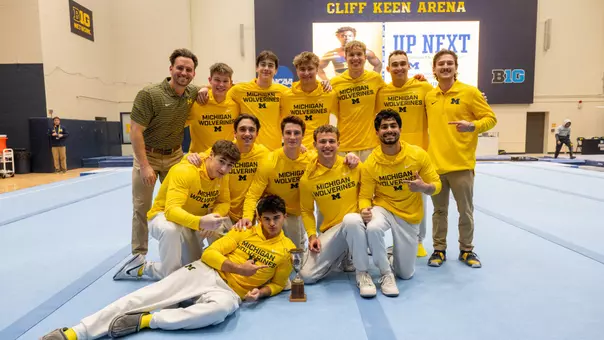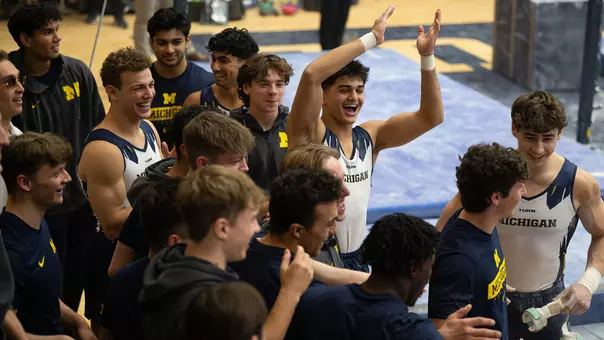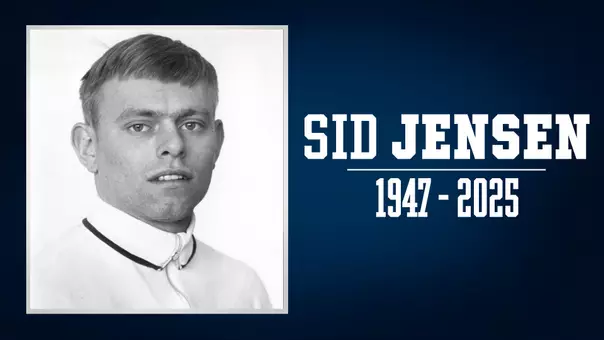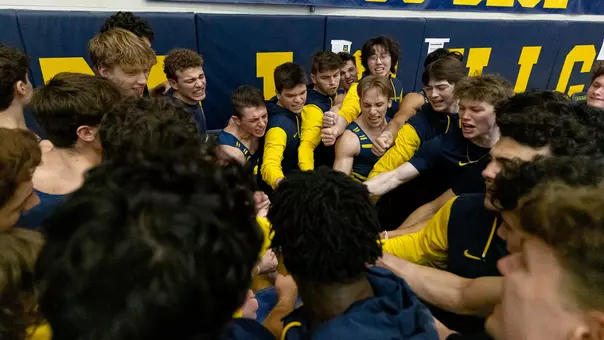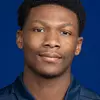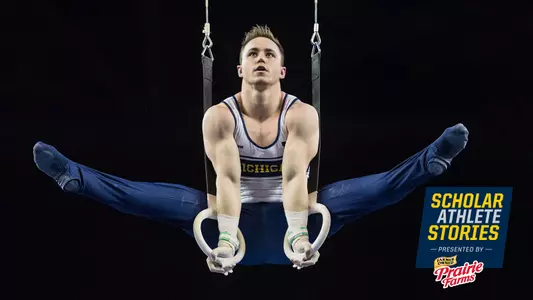
Scholar Stories: Gymnast Dunning Using Coding Skills to Improve Routines
2/27/2019 11:48:00 AM | Men's Gymnastics, Features
Continuing the popular series that began in 2016-17, each Wednesday MGoBlue.com will highlight a Michigan student-athlete and their academic pursuits. These are our Scholar-Athlete Stories, presented by Prairie Farms.
By Max Brill
The word "development" gets thrown around a lot in sports, particularly in reference to student-athletes, players and programs. But when Ryan Dunning uses that word, it's in a literal sense, and it's often related to software.
Dunning, a still rings specialist on the University of Michigan men's gymnastics team, is a senior in the College of Engineering majoring in computer science, though he began his undergraduate career thinking he would become an electrical engineer. He credits his brother, Brandon, who graduated with the same degree from the University of New Mexico, for originally piquing his interest in computer science.
Once he made the switch though, he knew that he wanted to work with computers and code as a career. Helping others -- through computers -- is the most rewarding work he can do, and he found that passion while working on a class project with teammate Uche Eke.
"We were trying to develop remote viewership for gymnastics competitions so that patients at the Mott Children's Hospital could watch competitions and meets without being there," Dunning said. "We filmed the meets with a 360-degree camera, so it captured all the action around the gym. And with a virtual reality headset, you could place people basically on the floor of a competition and let them experience what it was like to view the meet from that point."
The Corrales, New Mexico, native was fortunate enough to intern with Edwards Brothers Malloy, an Ann Arbor-based printing company last summer. One of the most enjoyable aspects of the internship was adapting to others and learning how to help in different situations.
"I really enjoyed going to other employees' workstations and observing them and talking to them," he said. "I wanted to figure out how I could help them and how I could help the company by streamlining some of their processes with technology. That's part of what I love with coding and computer science."
Once he graduates, Dunning wants to join a startup where he will have the opportunity to utilize new technology to improve the lives of others.
"I really just want to work on new things -- groundbreaking things that haven't been done before. I'd love to work with some of the newer technology that's been coming out that has a lot of promise to be helpful to a lot of people and make people's lives easier, to make people's jobs easier."

Unsurprisingly, Dunning has found a way to bring his expertise in coding to his gymnastics training. He said that the process for planning his programs and his routines is the same: plan, design, build and then execute.
"You start with the logical reasoning," he says. "'Here are all the rules, how can I make something that best fits me?' That's the design phase. Then, you go out and do the strength training and the repetitions -- that's the building phase.
"Next, you test. You put together a routine that has a culmination of design and building and you get to see it all come together. You do that over and over again and the product keeps getting better. The routine keeps getting better."
All of that hard work culminated in an All-America honor for Dunning following his junior season. He surpassed 14.000 on two occasions during that season and scored back-to-back 13.900s at the NCAA Championships on rings.
The reason for that improvement? His studies.
"I came into college not really a rings specialist and was able to really just hone in on my routine," he said. "I think with the computer science approach I have to my routines, I was able to refine really well and build a routine that would give me the best opportunity to get recognition like an All-America award."
For Dunning, though, national recognition was not the end goal.
"Really, the focus is always on the team and what I can do to increase my score to help the team out."

Dunning has begun his final season with multiple stellar efforts, scoring higher than 14.000 during the Wolverines' Feb. 2 dual meet against Ohio State and setting a new career high with a 14.550 against Oklahoma on Feb. 23. He says that there is more work to be done, though, and that the team is excited to show off the hard work they've done in the offseason.
"We're a team that's matured this year," he said. "When I came in, about half the team was freshmen. What I love about this year is that we have a lot of maturity and experience behind us."
And when it's all said and done, Dunning wants to follow the advice of head coach Kurt Golder.
"Coach Golder always says that he wants us to leave the program better than we found it," Dunning said. "Hopefully, I can leave traces of my work ethic and good relationships with teammates. I want the younger guys to know how important their teammates are and how important it is to work hard every day, because I want them to take the most advantage of the environment I was lucky enough to grow up in."

